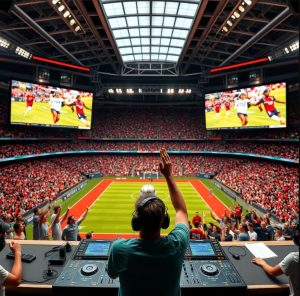The Harmony Between Music and Tile Cleaning Professionals
 Music has always been a universal companion to labor. Whether in construction, cleaning, or creative fields, it keeps workers motivated, improves focus, and creates a sense of flow. For tile cleaning professionals, music can turn a physically demanding job into a rhythmic and enjoyable experience. The repetitive motions of scrubbing, polishing, and buffing often align naturally with a steady beat, helping workers maintain consistency in their pace.
Music has always been a universal companion to labor. Whether in construction, cleaning, or creative fields, it keeps workers motivated, improves focus, and creates a sense of flow. For tile cleaning professionals, music can turn a physically demanding job into a rhythmic and enjoyable experience. The repetitive motions of scrubbing, polishing, and buffing often align naturally with a steady beat, helping workers maintain consistency in their pace.
Many tile cleaners find that listening to upbeat or instrumental tracks helps them stay energized throughout long hours of detailed work. A lively tune can make heavy cleaning tasks feel lighter, while softer music helps during meticulous steps such as grout detailing or polishing edges. The right playlist, therefore, can influence both mood and productivity, creating a perfect balance between precision and performance.
The Science Behind Music and Productivity
Studies have shown that background music can enhance performance in manual and repetitive tasks. It helps reduce fatigue, improves concentration, and even lowers perceived effort. For tile cleaning professionals, this can translate to better endurance and fewer mistakes. When cleaning large areas such as commercial floors or tiled walls, maintaining focus for long periods is critical. Music helps fill the silence, reduces mental fatigue, and creates a sense of rhythm that matches the pace of the work.
However, not all genres work for everyone. Some professionals prefer energetic beats to stay motivated, while others choose ambient or classical music to maintain calm and focus. The key is to choose sounds that complement the task at hand—music that energizes but doesn’t distract. A professional cleaning team might even agree on shared playlists that reflect their collective energy, promoting teamwork and a positive atmosphere.
How Music Enhances Team Dynamics
Tile cleaning often involves collaboration. Crews work together to move equipment, clean sections in sequence, and ensure uniform results. When the team works in sync—literally and figuratively—music can help coordinate effort. A shared rhythm helps maintain timing, so tasks like polishing or buffing large tiles appear seamless.
Beyond rhythm, music strengthens morale. It helps teams stay connected, reduces tension during long projects, and even turns repetitive tasks into moments of shared enjoyment. Many professional cleaning companies recognize this benefit and allow their teams to use Bluetooth speakers during work hours. As long as the volume stays appropriate and safety remains a priority, music can transform the atmosphere from mechanical to lively.
Music also encourages communication. When workers are relaxed and in good spirits, they communicate better about workflow, timing, and results. A happier team is often more productive and produces better outcomes for clients.
The Professional Side: Music Meets Clean Spaces
While music enhances mood and performance, professionalism remains central to tile cleaning. Professionals know when to keep the volume moderate, ensuring it doesn’t interfere with communication or disturb clients. Cleaners often adjust their music depending on where they work—louder, energetic playlists for industrial sites, and soft, instrumental tracks for residential or office settings.
Tile cleaning itself requires skill, patience, and attention to detail. Professionals handle various types of tiles—ceramic, porcelain, marble, or stone—each with its own care requirements. They use specialized tools and cleaning agents to restore shine and remove deep-seated dirt without causing damage. Just like a musician mastering their instrument, tile cleaning professionals rely on rhythm and technique. Every sweep, rinse, and polish becomes part of a performance aiming for a flawless finish.
Some cleaning companies even integrate music into their training programs. They use rhythm-based instruction to help new cleaners maintain consistent speed and pressure. This helps standardize quality and ensures that each technician develops a sense of control similar to timing in a song.
Music as a Tool for Mental Well-Being
Tile cleaning can be physically demanding, and repetitive work may sometimes feel monotonous. Music offers mental relief. It provides a healthy distraction from fatigue and encourages a sense of progress. The connection between sound and satisfaction is powerful—finishing a shiny, spotless floor while listening to a favorite song gives workers a sense of accomplishment that’s both emotional and visual.
For independent cleaners, music also reduces the feeling of isolation. Working alone in large spaces can be quiet and draining, but having a personal playlist creates companionship. It helps maintain motivation, even during long or difficult cleaning sessions.
In addition, upbeat music can trigger the release of dopamine—the “feel-good” neurotransmitter—helping reduce stress and improve focus. This mental boost translates directly to better performance and higher job satisfaction, which in turn benefits customers through consistent service quality.
 In many Asian cultures, especially in Chinese opera, there is a unique art called “mask changing” or Bian Lian. This performance art involves skilled performers’ mask changing performance Singapore in the blink of an eye—sometimes without even touching their face. What makes this act even more captivating is the music that plays in the background. Together, music and mask changing create a theatrical experience that’s both powerful and mysterious.
In many Asian cultures, especially in Chinese opera, there is a unique art called “mask changing” or Bian Lian. This performance art involves skilled performers’ mask changing performance Singapore in the blink of an eye—sometimes without even touching their face. What makes this act even more captivating is the music that plays in the background. Together, music and mask changing create a theatrical experience that’s both powerful and mysterious. Music and sports broadcast have formed a powerful partnership over the years. From high-energy intros to emotional soundtracks during key moments, music plays a role in how fans experience their favorite sports. Broadcasters rely on music to create excitement, build tension, and add a sense of drama to games. Without the right tunes, even the most thrilling moments in sports can feel flat.
Music and sports broadcast have formed a powerful partnership over the years. From high-energy intros to emotional soundtracks during key moments, music plays a role in how fans experience their favorite sports. Broadcasters rely on music to create excitement, build tension, and add a sense of drama to games. Without the right tunes, even the most thrilling moments in sports can feel flat. The call for inclusivity and safety is more pronounced than ever. As diverse groups seek spaces where they can enjoy music and social interaction without fear of discrimination or discomfort, the importance of inclusivity cannot
The call for inclusivity and safety is more pronounced than ever. As diverse groups seek spaces where they can enjoy music and social interaction without fear of discrimination or discomfort, the importance of inclusivity cannot 



 The music in the game is much more than just a lovely melody. Music in missions aids in the resolution of some problems, and background music is activated for other purposes. To see this, disable the music in
The music in the game is much more than just a lovely melody. Music in missions aids in the resolution of some problems, and background music is activated for other purposes. To see this, disable the music in 



